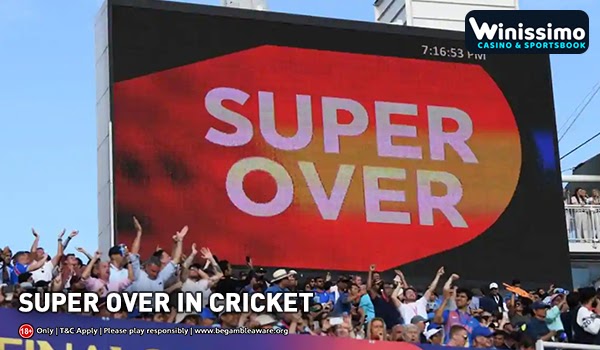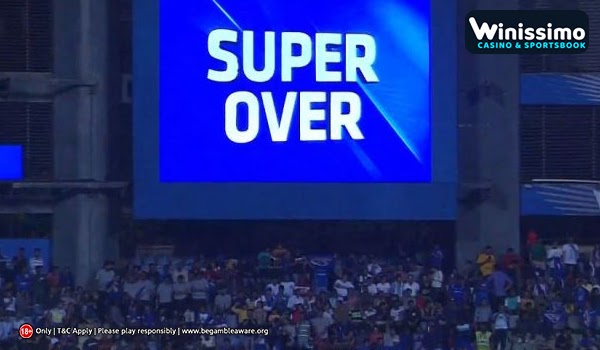What is a Super Over?
A Super Over, also known as an Eliminator, is a strategy of tie-breaking used in limited-over cricket matches. Each team nominates three batsmen and a bowler for the Super Over if a game ends in a draw. Both teams head back to the crease. The first team bowls and fields for one over while the second team bats. Then the second team bowls an over and the bats of the first team. This match is awarded to the team that scores the most runs. A team’s Super Over stops if it loses two wickets. Wickets may be taken as usual.

Instead of splitting the points between the two competing teams evenly, the “Super Overs” winning team gets all the points, but the outcome is still counted as a draw. In Twenty20 cricket, the Super Over was first introduced in 2008, replacing the previously introduced Bowl-out technique to break a tie. Today, the term ‘Super Over’ is also widely used in sports betting, particularly cricket. The International Cricket Council made changes to the One Over Per Side Eliminator (T20Is only) on October 29, 2012.
Rules
The match is won by the team that has scored the most sixes in their innings if the scores in the Super Over are tied. In the 5 May 2010 ICC Women’s World Twenty20 match between Australia’s team and England’s team, won by Australia, the first recorded use of this rule in Twenty20 Internationals was.
Example
The first adoption of Super Overs was in the tied Twenty20 match between the West Indies and New Zealand, on December 26, 2008. In their super-over, the West Indies scored 25/1 and New Zealand answered with 15/2.
Super Over and Betting
Cricket betting is so popular among all the sports betting options and super over is an integral part of it. There are numerous online casino sites that offer excellent cricket odds and Winissimo is one such online casino.
Let us look at the best cricket odds offered.

Win & Most Team Runs
- In the event of a Super Over, the official score will determine the match-winner, but player runs during the Super Over will not count against the overall runs in the match.
- In the event of a tie where no Super Over is played with respect to cricket betting, the bets will be void.
- If a batsman retires and does not resume his innings, his performance would stand out. Bets are made on a player in the starting eleven stands, whether they bat or not.
The Present Situation
New Super over rules to be used in the case of a draw in T20 International matches were adopted by the International Cricket Council (ICC) this year.
The rules for Super over:
If the playing conditions call for a Super Over to determine the winner of a drawn match, the following rules apply.
- A Super Over is played if the match is tied. If the Super Over is a draw, so additional Super Overs will be played until there is a winner. There will be an infinite number of Super Overs played to produce an outcome, until extraordinary conditions exist.
- Each team is included in the Super Over and faces one over (unless all out before), and the winner is the team that scores the most runs from its one over innings. The loss of two wickets in the over ends with one in the innings of the side.
- In each inning of the Super Over, each team is allowed to conduct one ineffective Player Analysis. This entitlement applies regardless of the amount of failed demands for a Player Evaluation submitted during the match itself.
- On the scheduled day of the game, the Super Over will take place, subject to weather conditions, at a time to be determined by the ICC Match Referee. In normal conditions, it begins 5 minutes after the end of the match.
- The Super Over will be played before the end, but Extra Time (taken from the beginning of the first Super Over) is allotted to complete the Super Over or any additional Super Overs where there are any glitches or interruptions during the Super Over.

If play is interrupted before or after the Super Over(s) where the missed game time reaches the allotted extra time, the Super Over(s) will be abandoned.
- Unless otherwise decided by the umpires in coordination with the Field Authority and the ICC Match Referee, the Super Over will take place on the pitch reserved for the match (the assigned pitch).
- In the Super Over, only nominated players in the match (including enabled concussion substitutions) can participate. If any player (including batsmen and bowlers) is unable to proceed to compete in the Super over due to injury, sickness or other appropriate causes, the Super Over shall also be subject to the specific playing conditions as applicable in the match.
- The Super Over will be transferred to every penalty period spent in the match.
- The umpires would remain at the same end of the field where they ended the match.
- In the Super Over, the team batting second in the match will bat first.
- The captain of the fielding team (or his nominee) shall pick from the box of spare balls provided by the umpires (which shall contain the balls used in the match but no new balls) the ball with which the fielding team shall bowl it’s over in the Super Over. The first option of the ball is necessary for the team fielding first in the Super Over. The team fielding second will choose to use the same ball as the team bowling first picked. The Game Rules differ if the ball has to be changed.
- The fielding side must choose the end to bowl it’s one over from.
- In a game played under the ICC Twenty20 International Playing Conditions, each team’s over is played with the same fielding restrictions as the last over.
- The Super Over winners is the side who scored the most runs, regardless of the number of wickets dropped, according to standard playing conditions.
Tied Super over- The Super Over Method Repeated
- If the Super Over is tied, until there is a winner, additional Super overs will be played.
- Any subsequent Super Over will resume 5 minutes after the previous Super Over finishes under normal circumstances. There must be 5 minutes.
- In the following Super Over, the team batting second in the prior Super Over will bat first.
- In subsequent Super Overs, the balls chosen for use by each team in the previous Super Over will be used again by the same team.
- The fielding side must bowl it from the reverse end to where it bowled from in the previous Super Over in the following Super Over.
- In the following Super Over, any batsman dismissed in the previous Super Over will be ineligible to bat.
- In the following Super Over, the bowler who bowled the over in the preceding Super Over will be unable to bowl the over.
- The other conditions for playing will be the same as for the original Super Over.
- In situations where there are inevitable time restrictions, but not limited to, double-header matches that do not allow several Super Overs to be completed, the Home Board can restrict the number of potential Super Overs before the start of the series and by notifying the competing teams.
